Jeans are like loungewear to me, meaning that I practically live in denim. In my teens and twenties, I wore through many pairs of jeans, knowing that each pair took a huge environmental toll. These days, I look to invest in sustainable, organic, eco-friendly jeans that last. Here are the best sustainable denim brands for ‘green’ jeans.
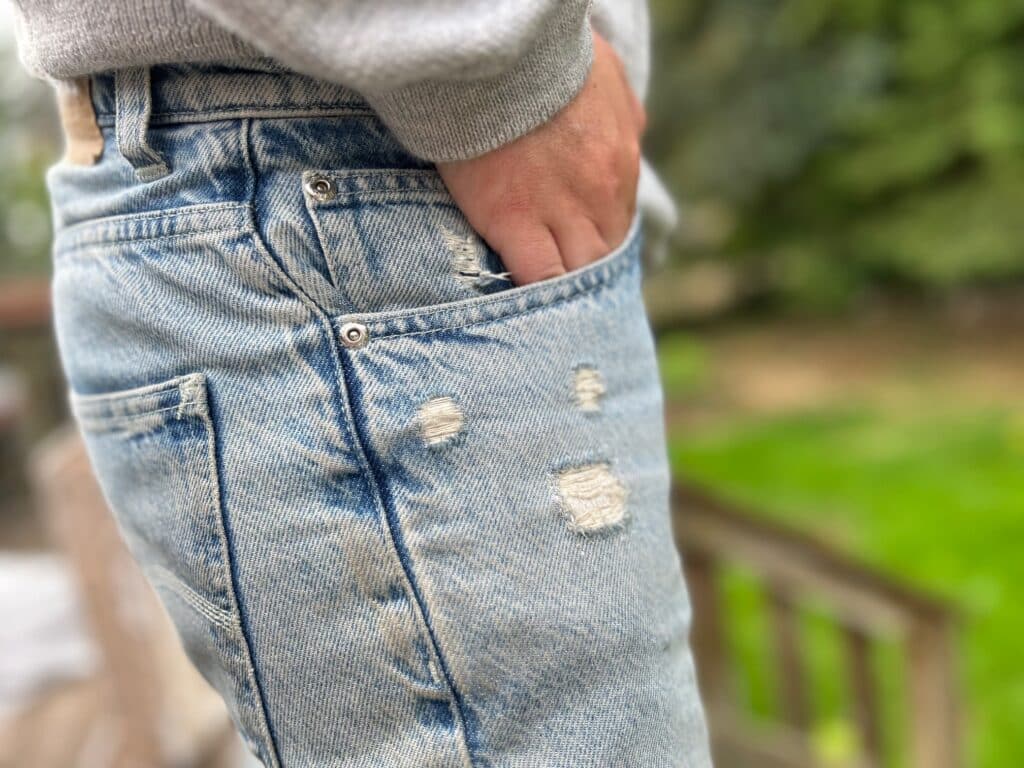
Table of Contents
Not to be a stereotype or anything, but I may have rocked a Canadian Tuxedo once or twice, so it’s a truly sad day when a pair of jeans finally wears through to an irreparable degree.
The good news is that whereas eco-friendly denim used to mean a trip to the thrift store, nowadays there are plenty of brands offering jeans, jackets, shorts, skirts, and other items made with sustainable denim.
Things to look for in a sustainable denim brand include:
- Use of organic cotton (certified by GOTS or USDA Organic)
- Use of recycled materials, including for zippers, threads, and packaging
- Smart manufacturing processes that use less water and energy
- No use of harsh toxic chemicals (no bleach, carcinogenic dyestuffs, or acid washes)
- Sustainable packaging (recycled and recyclable materials and no plastic)
- Closed loop systems with an option to return old jeans for repair, recycling, or upcycling.
The best sustainable denim brands
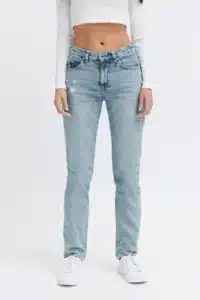
Organsk Jeans [Staff Tested]
Highlights: GOTS certified organic jeans made using organic cotton, recycled materials, wind power, and water-saving, chemical-free processes. Super sustainable company with a circular business model and subscription options!
- Sustainable at every stage
- GOTS certified organic
- Nordic Swan EcoLabel
- No plastic packaging
- Low carbon footprint
- Jeans run long
Organsk is the only jeans brand that is certified sustainable at every stage, “from fiber to garment”. I got myself a pair this summer and I absolutely love them.
As well as being GOTS certified organic, these jeans carry the rare Nordic Swan EcoLabel as well as Oeko-Tex and GRS seals. The jeans are made of entirely organic or recycled materials, are totally non-toxic, and are manufactured in a smart way that minimizes water use, energy inputs, chemicals, and fabric waste.
The Organsk team deliberately set out to make jeans more sustainably. That ethos also carries through to the company’s business model, which lets you buy jeans outright or sign up for a subscription. With the subscription, you can get a new pair of jeans every six months (sending the old ones back for resale or recycling).
Organsk focuses on making timeless jeans rather than fast fashion. There are styles for all genders, with blue, black, and bright vintage options.
The company doesn’t use plastic packaging and has carried out lifecycle analyses for its core jeans collection. My favorite pair, which I’ve been wearing for months now with no signs of wear or tear, are the Aqua jeans. These are made using just 24.7 liters of water and 3.7 kWh of electricity for washing. The industry standard for jeans is 200-500 liters of water, which also means vastly more electricity.
Aside from being eco-friendly, my Organsk Aque jeans look and feel great. I got a ton of compliments when I first wore my jeans and they continue to be comfortable as we head into fall. And if I want to switch up my style someday, I can send these back to Organsk for credit against another style! Win win!
My one caution is that these jeans run long and are very roomy. I am 5’6″, somewhat petite, but quite curvy. I assumed the jeans would fit fairly snug, given the high-waist design, but they actually hang lower than expected and are large in the hip and thigh, as well as being long enough that I have to turn up the bottoms.
I enjoy the slouchy look, and it’s great for summer, but if you like your jeans tighter, consider sizing down or ask Organsk for advice on sizing.
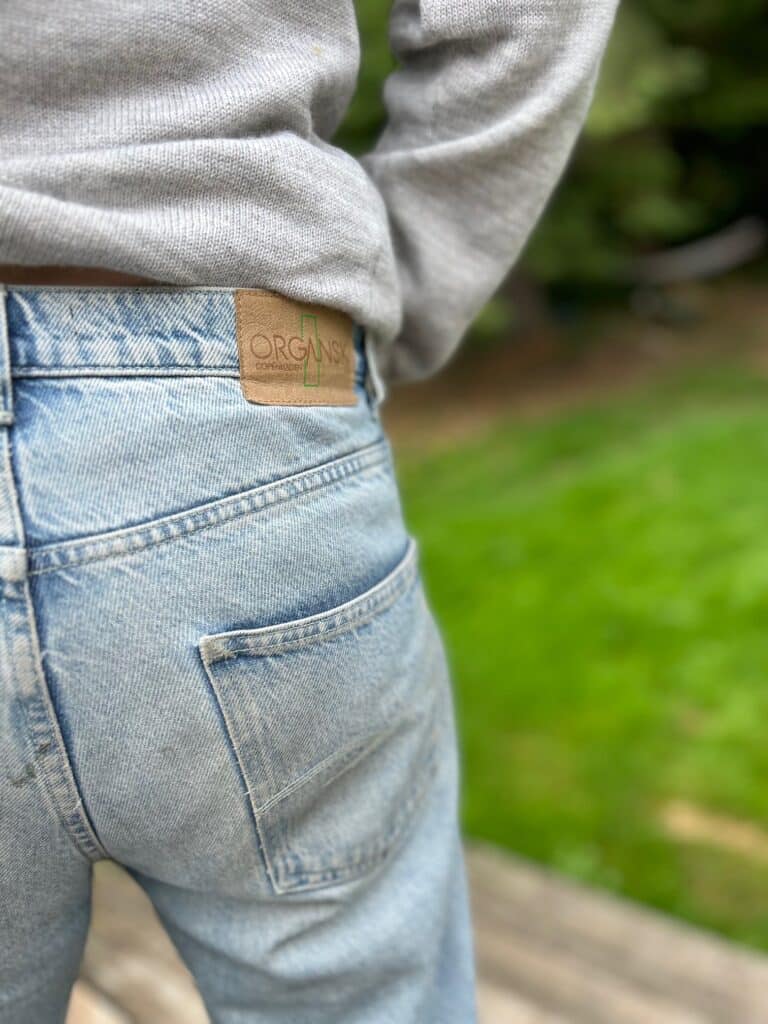
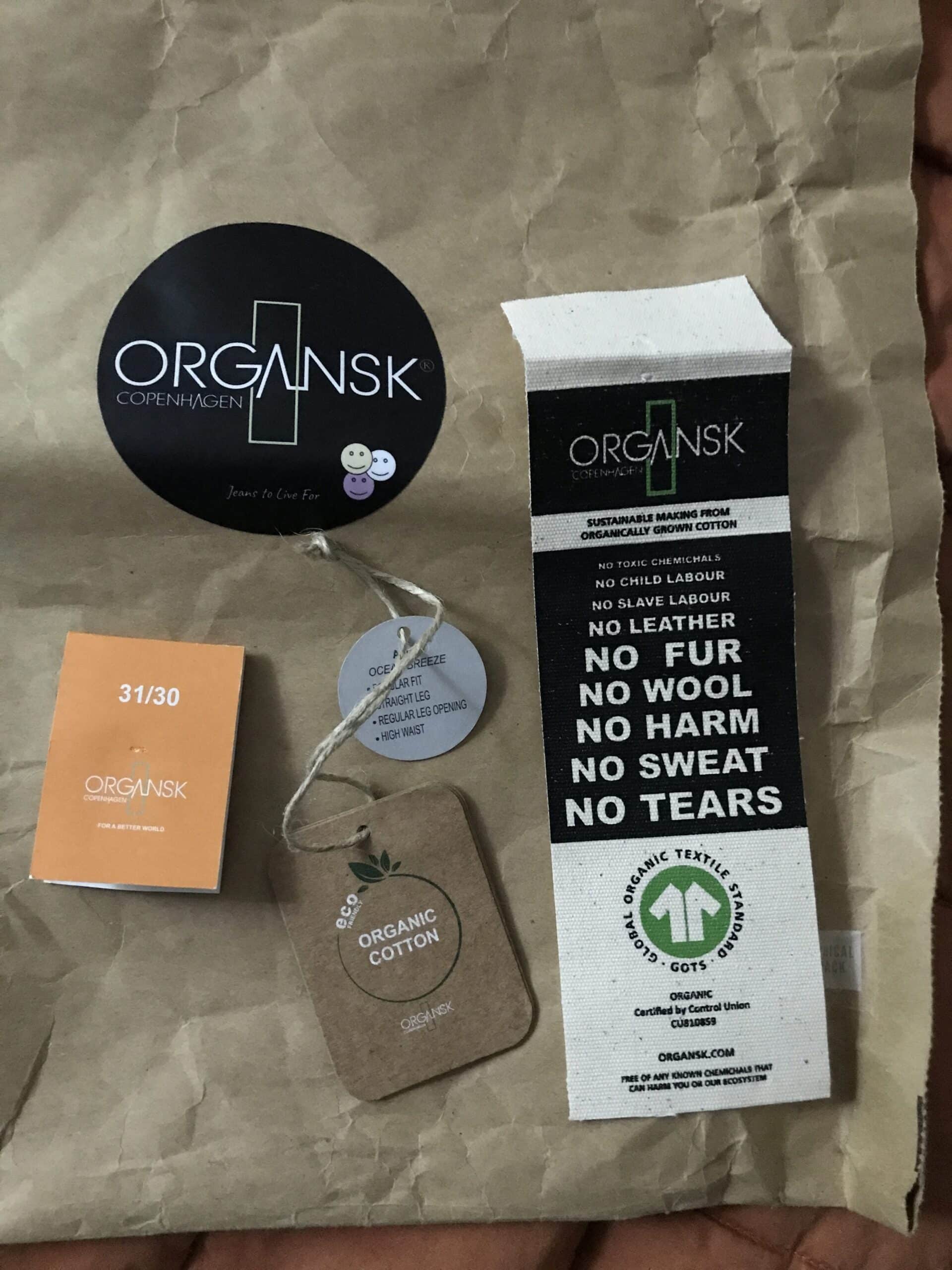
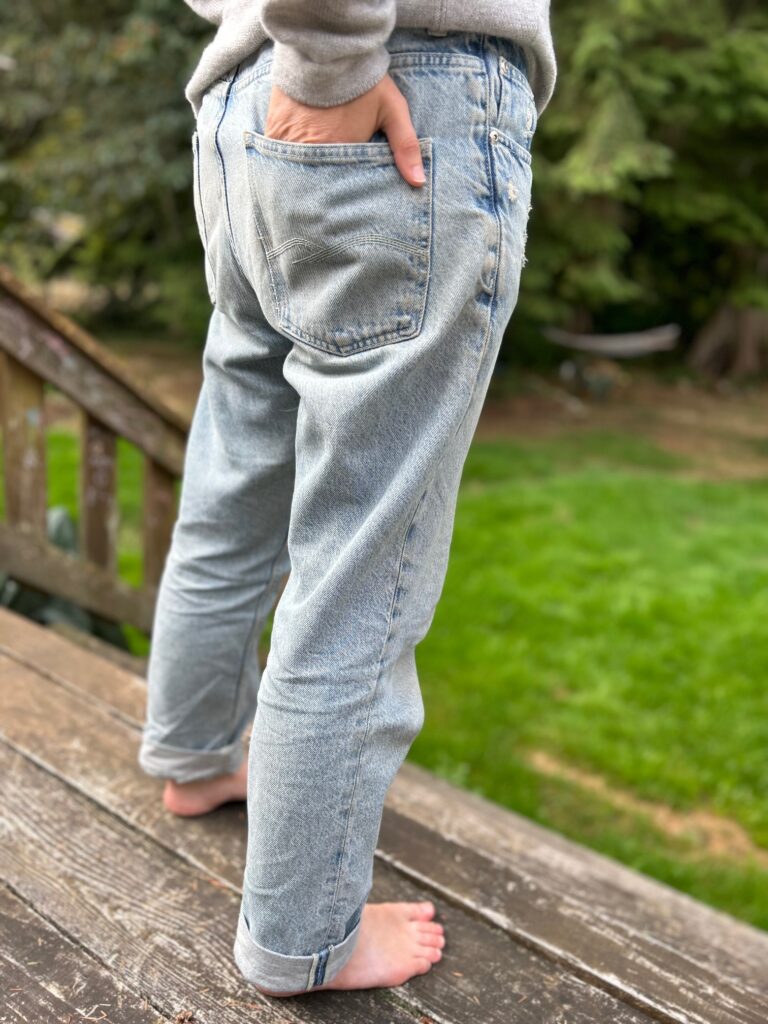
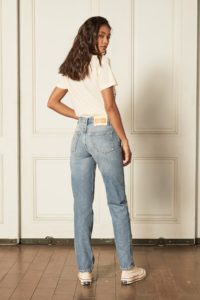
Boyish
Highlights: Certified Climate Neutral company making eco-friendly denim from GOTS certified organic cotton, recycled metal, and recycled fibers, using sustainable processes. They also use 100% compostable and/or recycled packaging materials
- GOTS certified
- Water saving manufacturing process
- Cruelty free
- Some online reviews complain of awkward sizing
Boyish is an LA-based fashion brand that specializes in women’s denim clothing using organic cotton and recycled fibers. The company is certified Climate Neutral and makes clothes in an ethical way with a focus on fair labor. All of the company’s mills and factories are GOTS certified and the company uses a water-saving process and plant-based, low impact dyes.
Boyish is also a member of The Jeans Redesign project from the Ellen MacArthur Foundation, which outlines circular economy guidelines including making durable products. And the company recycles all its cutting waste, diverting some into new fabrics and recycling the rest for industrial use. All metal components of the clothing are made with recycled metal.
The company is cruelty-free too, using no animal products and with ethical production and fair labor standards. Boyish also uses an ozone wash instead of chlorine bleach, a natural enzyme instead of polluting potassium permanganate, and REFIBRA™, a fabric made using upcycled clothing and fabric scraps with Tencel. This and all other recycled fabrics are third-party verified as recycled by the Global Recycling Standard. They also use organic cotton certified by the Organic Content Standard (OCS Certified) and recycled cotton, which is the most sustainable cotton fiber source according to the Sustainable Apparel Coalition’s Higg Index.
The textiles used are verified to OEKO-Tex Standard 100 and the company works with fabric mills and factories worldwide that are part of the ZDHC Program, Roadmap to Zero. This looks to advance water safety and keep harsh chemicals out of water streams. As part of this approach, Boyish avoids using traditional pumice stone washing (which generates high carbon emissions from mining and turns water into unrecyclable sludge), and instead use faux stones that can be reused along with the water.
You’ll receive your Boyish jeans in a 100% compostable shipping bag that breaks down in less than a year, and all hanging tags are made with recycled paper and all labels with recycled materials.
Oh, and Boyish has a Consignment Shop, where you can sell your old Boyish items and buy pre-loved items at a bargain price!
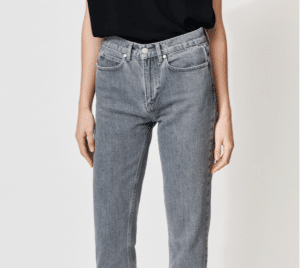
Mayla
Highlights: A Swedish clothing brand that takes sustainability seriously, Mayla offer organic cotton denim jeans and carbon neutral shipping, among other eco-friendly measures.
- PETA certified vegan
- GOTS organic cotton, deadstock and recycled fabrics
- Sustainable washing methods for texturizing
- Small runs to minimize waste
- Circular recycling program
- Carbon neutral shipping worldwide
- Swedish, so bigger footprint for North American consumers
- Limited styles and sizes
Mayla is a sustainable clothing brand based in Stockholm, Sweden, and became officially PETA certified vegan in 2020. The company makes stylish jeans and denim skirts using organic cotton eco-denim produced using less water, chemicals, and energy than conventional jeans.
Mayla clothing is timeless, feminine, and practical, with styles ideal for business meetings, day-to-day parenting, vacations, and smart casual. As well as using sustainably sourced organic cotton, Mayla also produce garments from deadstock (leftover or over-ordered) fabrics from wholesalers, other designers, and fabric warehouses.
Some clothing is also made with REFIBRA™, a recycled fabric, and the company uses sustainable washing methods (such as Eco stone wash) to texturize the denim. Materials are chosen using the HIGG Materials Sustainability Index (Higg MSI) to measure the environmental sustainability impacts of different materials (energy, water and chemicals used to make materials, and any waste generated). Mayla also switched out their silk (which has an exceptionally poor HIGG score and isn’t vegan) for sustainable cellulose fibers from FSC certified forests in Scandinavia.
Mayla produces clothing in small runs to minimize overstock and potential waste. They deliberately design for durability, hoping that buyers will wear these pieces for years to come. If the denim does wear out or no longer fits, you can drop off pre-loved Mayla clothing at their stores and it will be reused or recycled.
Mayla clothing is produced mainly in Europe (80%), so as to reduce the company’s carbon footprint. These manufacturers are visited regularly to ensure fair working conditions. And when you check out, you can rest assured that Mayla offers worldwide carbon neutral shipping.
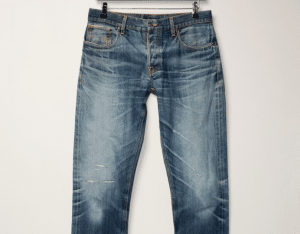
Nudie Jeans
Highlights: Fabulous company making GOTS organic cotton eco-denim with a Repair for Life program and a reuse and recycling scheme to help keep clothes out of landfill. Robust chemicals and carbon offsetting policy and all-round award-winning sustainability efforts.
- GOTS organic cotton
- Repairs for life, with option for at-home repair kit
- Good range of sizes, styles, and lengths
- Carbon offsetting for 100% of operations
- Circular Re-Use and recycling program
- Dedicated sustainability department!
- Fair Wear Foundation leader
- Very transparent about production and sustainability
- Swedish, so bigger footprint for North American consumers
- Kids sizes are expensive, but adjustable to grow with your kid
Nudie Jeans are one of the best sustainable options for eco-friendly denim, with carbon offsetting, living wages/fair trade, and GOTS organic cotton eco-denim designed to be worn for many years. The main collection was initially focused on jeans for men, but the company now offers kids jeans and ‘boyfriend jeans’ and other items to fit people of all genders.
Nudie Jeans also offer free tear repairs for life and give you a hefty discount on new jeans if you return old jeans to be reused or recycled. This also means you can score a bargain pair of pre-loved jeans through their Re-Use collection. If you can’t take your ripped jeans to a Nudie Jeans store, they company will send you a free repair kit so you can fix the jeans yourself. An estimated 45,900 pairs of jeans were repaired by the company in 2020.
Nudie Jeans is another Swedish company, this time based in Gothenburg, using 100% organic cotton (as of 2012 for denim and from 2017 for everything else). The company has a dedicated Sustainability Department with several staff members focused exclusively on Nudie Jeans’ sustainability work. This work has established Nudie Jeans as a leader in sustainability in fashion. So much so that the company has been named as a Fair Wear Foundation leader for seven years in a row, won Drapers Sustainable Fashion Award, was shortlisted in Fairtrade awards, and was nominated for an award by the Swedish Environment Protection Agency.
According to the company’s sustainability report, Nudie Jeans produced 98.6% sustainable products in 2019, meaning that almost all garments or accessories contained at least 70% sustainable fibers. The company also improved product transparency to show all tiers of the supply chain and mapped all emissions and water data across that whole supply chain. This allowed Nudie Jeans to accurately offset the entirety of its emissions through the UN Carbon Offset Platform. Nudie Jeans also has a Chemicals Policy created around the RSL (Restricted Substance List) and MRSL (Manufacturing Restricted Substance List),
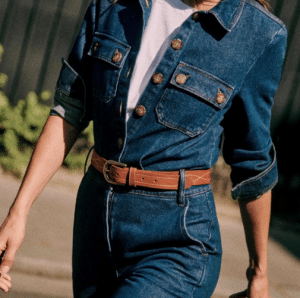
Sézane
Highlights: A Parisian fashion brand with a recent and robust shift of focus towards sustainable fashion. Within their expansive collection you can find pieces made with 100% GOTS-certified organic cotton, and other pieces made with recycled materials. Their locations are all powered by renewable energy, and efforts to continue in this direction are ongoing.
- Transparent B Corp with annual sustainability report
- GOTS certified organic cotton
- Wide variety of flattering jean silhouettes
- Company operations are powered by renewable energy
- Sustainable shipping
- Recycling program for used clothes
- Company also sells silk and leather products
- Parisian – so not quite as eco-friendly in North America
A Parisian fashion brand, Sézane offers affordable, vintage-inspired jeans, with a fairly recent and robust shift of focus to create more sustainable fashion. The collection includes pieces made with 100% GOTS-certified organic cotton, eco-friendly washing, recycled water, and laser detailing, avoiding harsh chemical processes. Some items contain recycled polyester to add stretch, but all new styles are made using GOTS certified organic cotton and a water-saving process.
Sézane states that 75% of its materials are eco-friendly, more than 50% of the pieces are certified sustainable in some way, and four of its lines are 100% eco-friendly. Specifically, 83% of the cotton used is organic and 68% of viscose is FSC Mix certified. The company does, however, use silk and leather, neither of which are eco-friendly or animal friendly.
Impressively, all of Sézane’s locations are powered by renewable energy, and in a year the company has reduced the carbon footprint of a Sézane garment by 22%. All of its shipping boxes are also now made using recycled cardboard and/or are derived from sustainably managed forests.
The company’s ‘Grand Collect’ program has so far resulted in more than 13,000 pieces having been recycled. This program allows consumers to donate used clothes (Sézane or other brands) at all its “Appartements” and “Conciergeries,” as well as its “Charity Boutique” and by mail (with prepaid shipping labels available on the website). These items are given to two charities that redistribute usable items or recycle them, which provides the clothes with a second life or – if they’re too damaged – recycle them. Sézane also supports partners that specialize in upcycling these products.
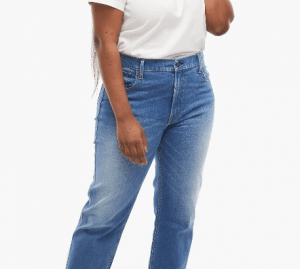
ABLE
Highlights: Socially responsible fashion brand making a wide range of jeans with a low carbon footprint using GOTS certified organic cotton. Their packaging is made with recycled materials with an aim of fully eco-friendly packaging in 2021.
- Socially minded, sustainable company
- Manufactured using methods that use less water
- Smart materials sourcing for lower carbon footprint
- Living wage employer
- Unlimited free exchanges until you get the right fit!
- Recycled and recyclable packaging
- Uses zero-waste, GOTS certified organic cotton supplier
- Company’s main collections are made with animal leather
- Limited styles and sizes for jeans
ABLE is a super transparent fashion brand that even posts company wages on its website! This helps concerned consumers see that ABLE has made serious improvements to wages to ensure almost all employees, be they in the US or Ethiopia, earn a living wage.
As for the jeans themselves, ABLE makes high-rise, slouchy, skinny, and classic jeans that are vintage-inspired and distressed. You can access unlimited free exchanges to ensure you get the perfect fit.
ABLE sources all of its denim from the western hemisphere, so as to reduce its carbon footprint during shipping. The non-stretch denim is dyed using liquid indigo, which means less water during manufacture. ABLE’s main vendor recycles 100% of the water used during denim production and uses ozone to further reduce water use. Denim scraps are recycled for use by the government for housing insulation and the vendor that produces organic cotton for ABLE operates as a zero waste factory and is GOTS certified.
Unfortunately, despite making eco-denim, ABLE’s main collection is based on leather, which is not environmentally friendly, or vegan (obviously). The company does try to minimize the impact of the leather it uses, including by using meat industry byproducts, creating small leather pieces from scrap left over from larger pieces, and choosing tanneries that are part of the Leather Working Group (which has environmental standards).
ABLE uses recycled mailers and repurposes shipping boxes at their HQ. In 2021, the company aims to make all packaging 100% recyclable.
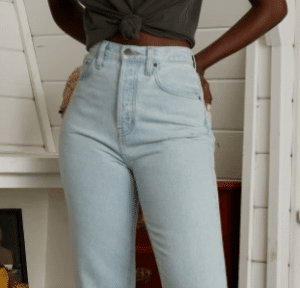
Ética
Highlights: An LA-based brand making denim using marginally more eco-friendly cotton than conventional jeans along with some GOTS certified cotton and other sustainable materials. Free from microplastics and animal products, with robust efforts at water and energy reduction in manufacturing. They offer eco-friendly packaging including biodegradable poly bags and 100% recycled hang tags and brand labels.
- BCI cotton for all cotton products
- Some products certified by GOTS, Oeko-Tex, and Cradle to Cradle
- Sustainable labels and packaging
- Vegan-friendly
- Some Tencel and REFIBRA products
- Deadstock and upcycled fabrics
- Bluesign certified
- Fair labor standards and socially responsible
- Not all organic cotton
- Limited size range
- Didn’t meet company goal of being plastic-free by 2022
Another LA-based fashion label, Ética is vertically integrated, committed to fair labor standards and social responsibility, and has taken big steps to minimize water and energy use as well as the use of harsh chemicals.
Ética claims to have reduced water use by 90%, energy consumption by 63% and chemical use by 70% compared to industry standards. The company is a member of the Better Cotton Initiative™, and some of its mills are also certified to OEKO-TEX Standard 100, Cradle to Cradle™ and GOTS. This means that each individual product has different certifications depending on where and how it was made.
All of the cotton used by Ética is BCI and the company is growing its use of organic cotton. It also uses recycled cotton, REFIBRA™, and Tencel in its denim lines and seasonal collections are made with deadstock and upcycled fabrics too.
All of Ética’s fabrics are Bluesign certified and the company’s mills use liquid indigo for most of the denim, helping to keep waste water sludge to a minimum. As of 2021, the company’s fabrics are all free of microplastics, and all products are vegan-friendly as they are 100% free of animal materials (including fur and hide, with no trims, softeners, dyes, or other additives used that are derived from animals).
Going a step further, the company’s brand labels are woven from 100% recycled material and its hang tags are printed with soy-based ink on 100% recycled paper, and plantable seed paper. All products are shipped in biodegradable poly bags, which break down within one year, and the company aims to be plastic free at its headquarters and factories by 2025 (originally 2022).
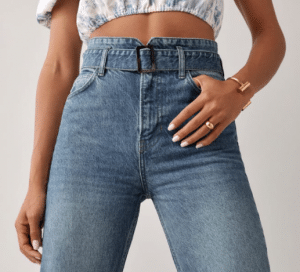
Reformation
Highlights: Carbon neutral company aiming to be Climate Positive by 2025, making some eco-denim clothing using (uncertified) organically grown cotton and recycled fibers without harsh chemicals. As far as their packaging goes, some efforts are being made at making packaging more eco-friendly (and making stores more eco-friendly too!)
- Affordable jeans
- Carbon neutral company
- Sustainability initiatives at the company
- More eco-friendly packaging than typical
- More eco-friendly manufacturing methods
- Limited sizes and lack of diversity in marketing
- Not all organic cotton
Reformation is one of our preferred swimwear brands at Leaf Score, and the company also makes somewhat eco-friendly denim at an affordable price. The range of styles includes some super fun newsprint styles, white denim, and very flattering high-rise cuts.
There are options galore, letting you find eco-denim in a color, wash, leg, rise, and fabric that suits you. Unfortunately, Reformation lacks size diversity in both the models used in photos and their product range, despite claiming otherwise. Their sizes range from a 00 (23) to a 12 (31).
The denim isn’t all made with organic cotton, alas, but is made using a process that dramatically cuts down on water and the amount of fiber used. They avoid using harsh chemicals in the finishing process, instead using non-chlorine-based bleaches and a neutral enzyme. Some items, such as the Liza Ultra High Rise Straight Jeans are made mostly with organically grown cotton (not certified), while other items are made with recycled fibers or conventional cotton and bamboo Lycocell or Tencel and elastane.
The jeans are made in Turkey and Los Angeles and the company has been carbon neutral since 2015 (made official more recently by Climate Neutral accreditation) and is aiming to be Climate Positive by 2025.
Every product has a RefScale which tells you its environmental impact including how much CO2, water and waste you save compared to average clothes in the US. The company also partnered with Native Energy and the Bonneville Environmental Foundation (BEF) Water Restoration Program to help put back some of the resources used to create Reformation products. Reformation also aims to recycle, compost organic wastes, and recycle or donate textile scraps whenever possible, with zero waste the ultimate goal.
Reformation also offers more eco-friendly packaging and uses paper hangers and reusable totes in stores to minimize plastic waste. The company also designs its stores to be greener, with LED lighting and recycled fabric insulation, for example.
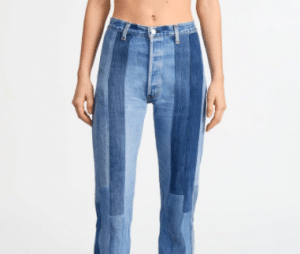
Re/Done
Highlights: This brand was created with the idea of upcycling vintage Levi’s into more modern styles in an attempt to lengthen the amount of time denim could be used – to the point where they’re now one of the largest upcycled fashion houses in the country!
- Huge selection of vintage and upcycled Levis
- Water-reduced denim
- Expensive
- One-off items, so limited sizes
Re/Done launched with the basic idea of upcycling vintage Levi’s into modern styles, helping to extend the life of discarded denim. The company estimates that it has diverted more than 145,000 garments from landfill, and Re/Done has grown from an original run of about 300 jeans to become one of the largest upcycled fashion houses in the US.
Re/Done also partnered with Hanes in 2016 to recreate vintage-inspired t-shirts from the brands back catalogue. Hanes created a recycled cotton fiber for the project and the collection has now expanded to include sweat pants and tank tops.
Re/Done also offers reduced-water denim, sneakers, and other items, but the upcycled collection is by far the most sustainable, along with the SecondHand marketplace where you can buy and sell Re/Done jeans, shirts, and more.
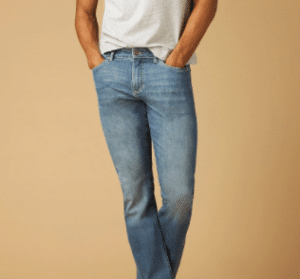
DL1961
Highlights: Marginally better denim purveyors with efforts made to reduce water and energy consumption in manufacturing and use recycled fibers. More work to do to improve transparency and serious sustainability though.
- Mostly manufactured in-house, which reduces emissions and waste
- Uses less water than conventional manufacturing
- Uses renewable energy
- Some garments made with recycled materials
- Not transparent about certifications or sustainability
- Expensive
- Limited size range
- Lack of diversity in marketing
DL1961 was established by Sarah Ahmed, who also founded Warp + Weft.
This is a family company with vertically integrated factories. This helps promote sustainability by keeping most manufacturing steps in-house, allowing for water- and waste-reduction strategies to be efficiently employed. Each pair of jeans is made using just 10 gallons of water, with near total recycling of that water, and DL1961 uses liquid indigo dyes free of harmful chemicals.
As for the fabric itself, the company appears to use a mix of conventional cotton, Modal and Lyocell in their jeans, which keeps them biodegradable and relatively low impact while improving durability and softness. In some cases, though it’s not clear which, products are made with recycled fibers including old denim and post-consumer waste which they shred and weave into new yarn.
DL1961 engages in a bit of good old greenwashing by stating proudly that they use ‘certified cotton’, without stating what it is certified as. It’s certainly not organic, nor is it certified to the Global Recycling Standard, OEKO-Tex, BlueSign, Fair Trade, or any other relevant standard. It would be nice to see greater transparency on this front and on sustainability efforts in general as DL1961 appears to want to position itself as an eco-friendly brand.
DL1961 does have a solar power plant and heat recovery system, which is nice to see. Unfortunately, the company provides no information about packaging sustainability.
All in all, this brand likely offers more eco-friendly denim than most but is no match for Organsk, Nudie Jeans, and most others on this list.
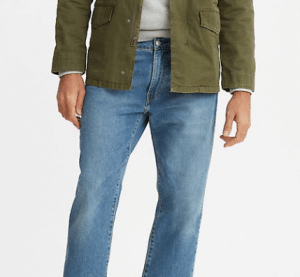
Levi’s
Highlights: Big brand name taking steps into sustainability with more eco-friendly manufacturing, some organic cotton and biodegradable fibers, and a secondhand marketplace.
- Reliable, affordable denim
- Wide size range
- Public commitments to improved sustainability
- SecondHand store is the most eco-friendly option
- Not fully organic
- ‘Organic’ products contain very little organic cotton
That’s right, good old Levi’s are getting in on the sustainability game. With prices starting at around $60, this affordable, well-known, and reliable brand of denim has shifted a lot of manufacturing practices to more eco-friendly methods. This includes reducing water consumption, reusing old denim, sourcing cotton more responsibly (though still not fully organic, alas), and using biodegradable fibers such as Tencel Lyocell instead of more synthetic materials.
While a handful of products are made with organic cotton, including some jeans, most are made with slightly better than conventional cotton. Even those marked as ‘organic’ are just made with a minimum of 15% organically grown cotton.
In 2010, Levi’s was a founding member of the Better Cotton Initiative (BCI), which is designed to train cotton farmers to use less water, pesticides, insecticides, and synthetic fertilizers. BCI isn’t anywhere close to GOTS cotton, but it’s a start. Levi’s has pledged to:
- Use 100% sustainably sourced cotton by 2025
- Use 100% renewable energy in owned & operated facilities by 2025
- Reduce greenhouse gas emissions in the supply chain by 40% by 2030
- Reduce water use in manufacturing in water-stressed areas by 50% by 2030.
Levi’s also reduced water use by an estimated 4.2 billion liters since 2011, with 6 billion liters of water reused and recycled. The brand also partnered with Cotton’s Blue Jeans Go Green program to divert denim from landfills and turn it into insulation material.
The best current option from Levi’s for eco-denim is their SecondHand store. Launched in the US in 2020, this vintage Levi’s store extends the life of pre-loved jeans and other denim with a wide range of styles and sizes. Some of the jeans have visible signs of wear such as hem fraying and other imperfections, but the company adds notes to highlight these.